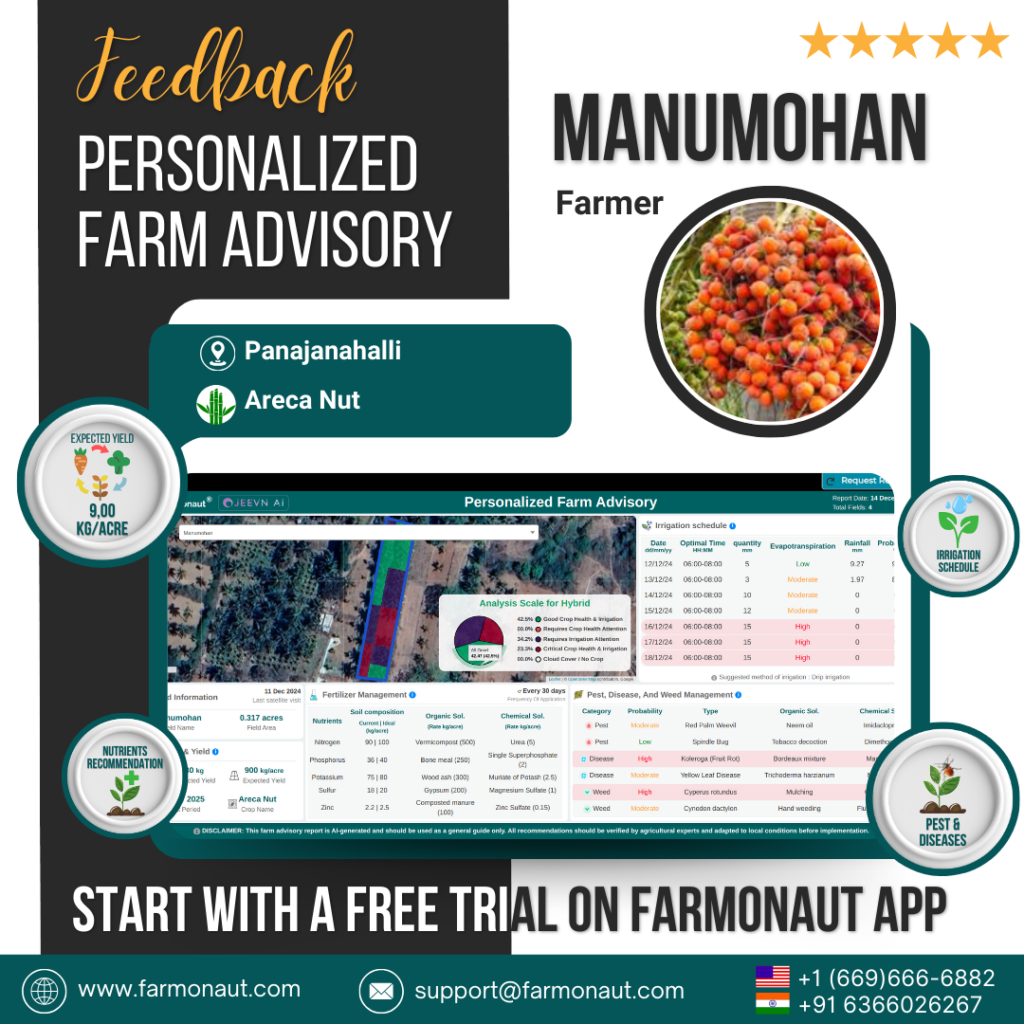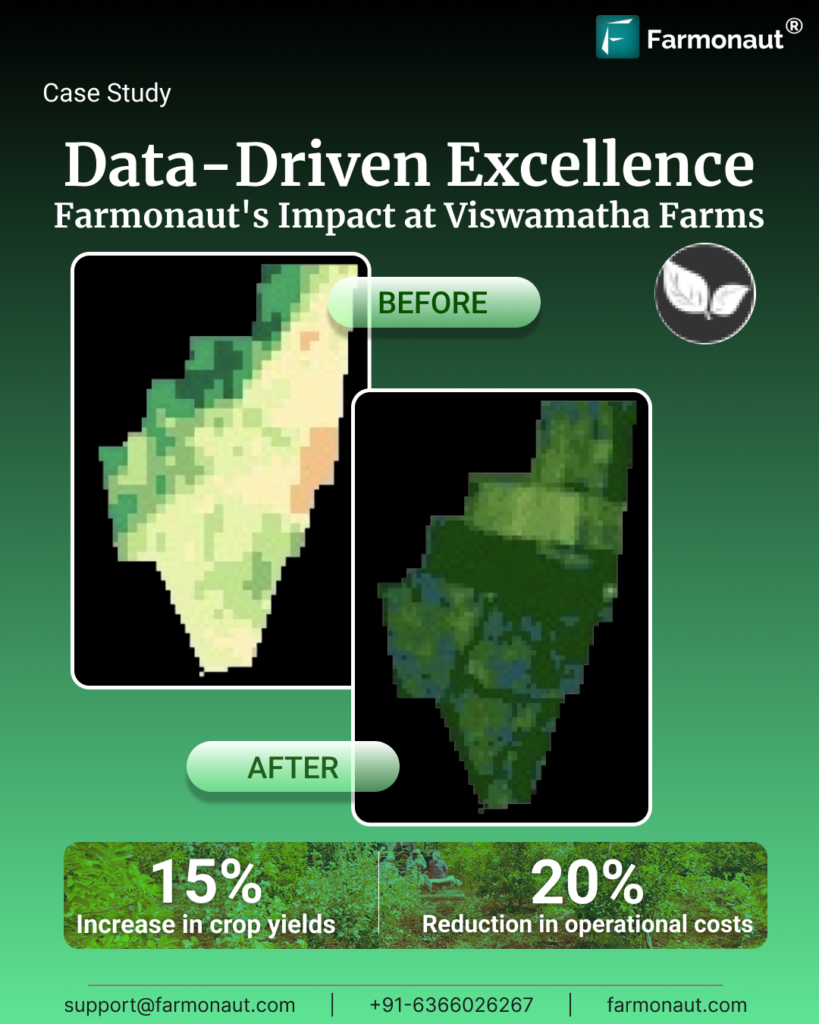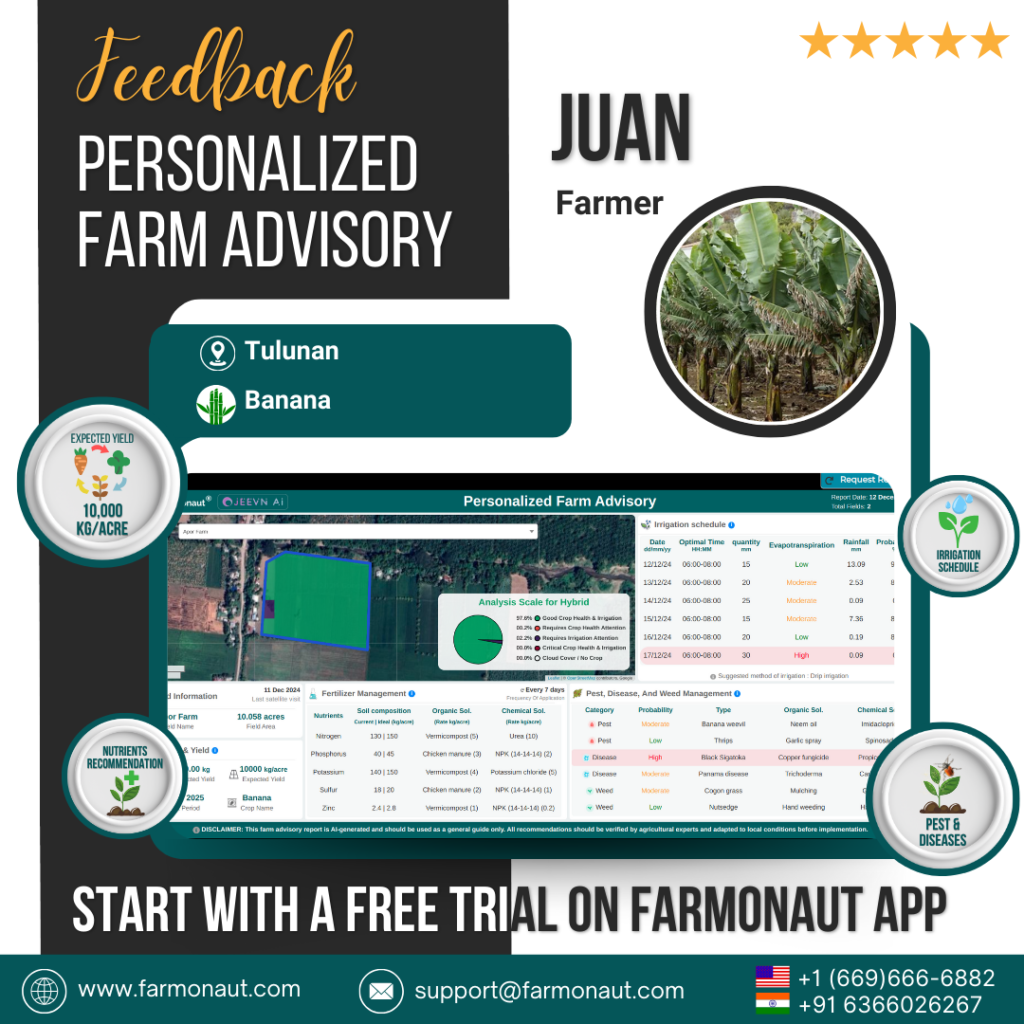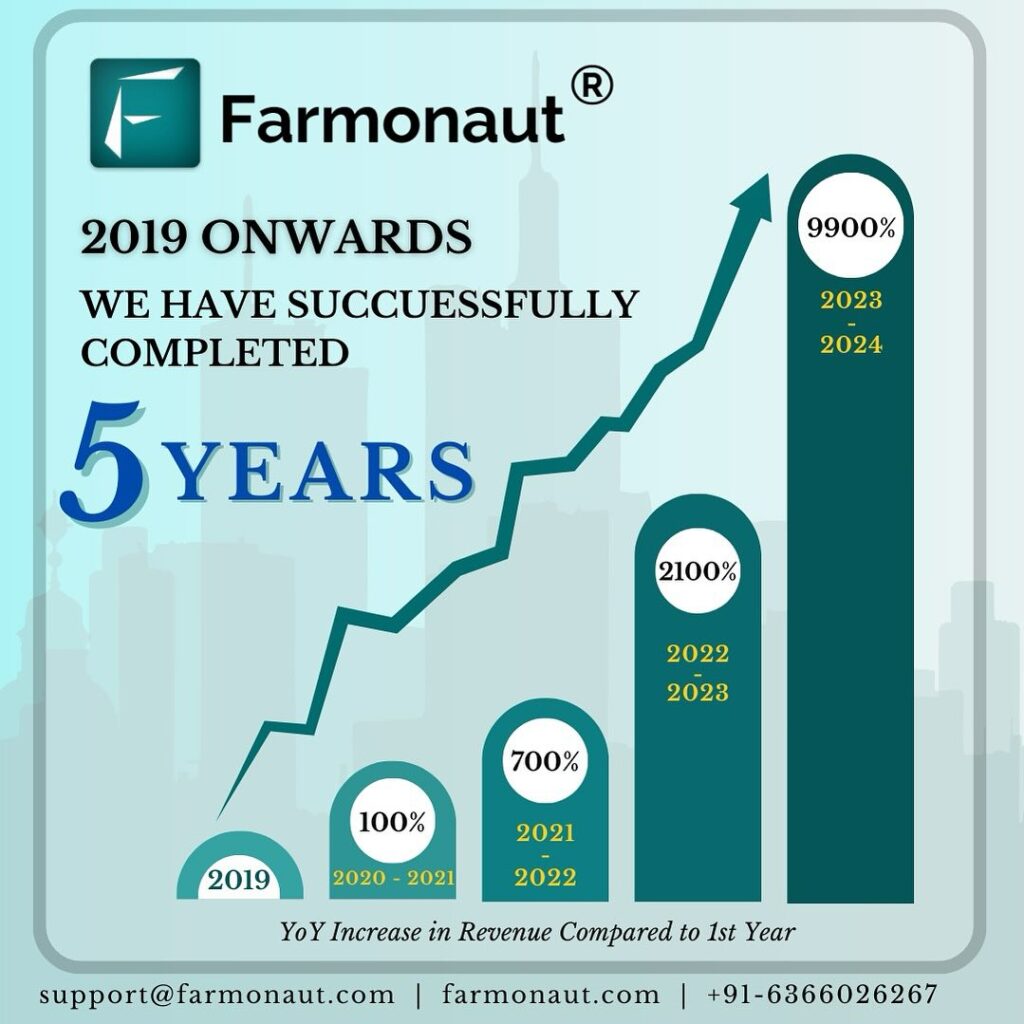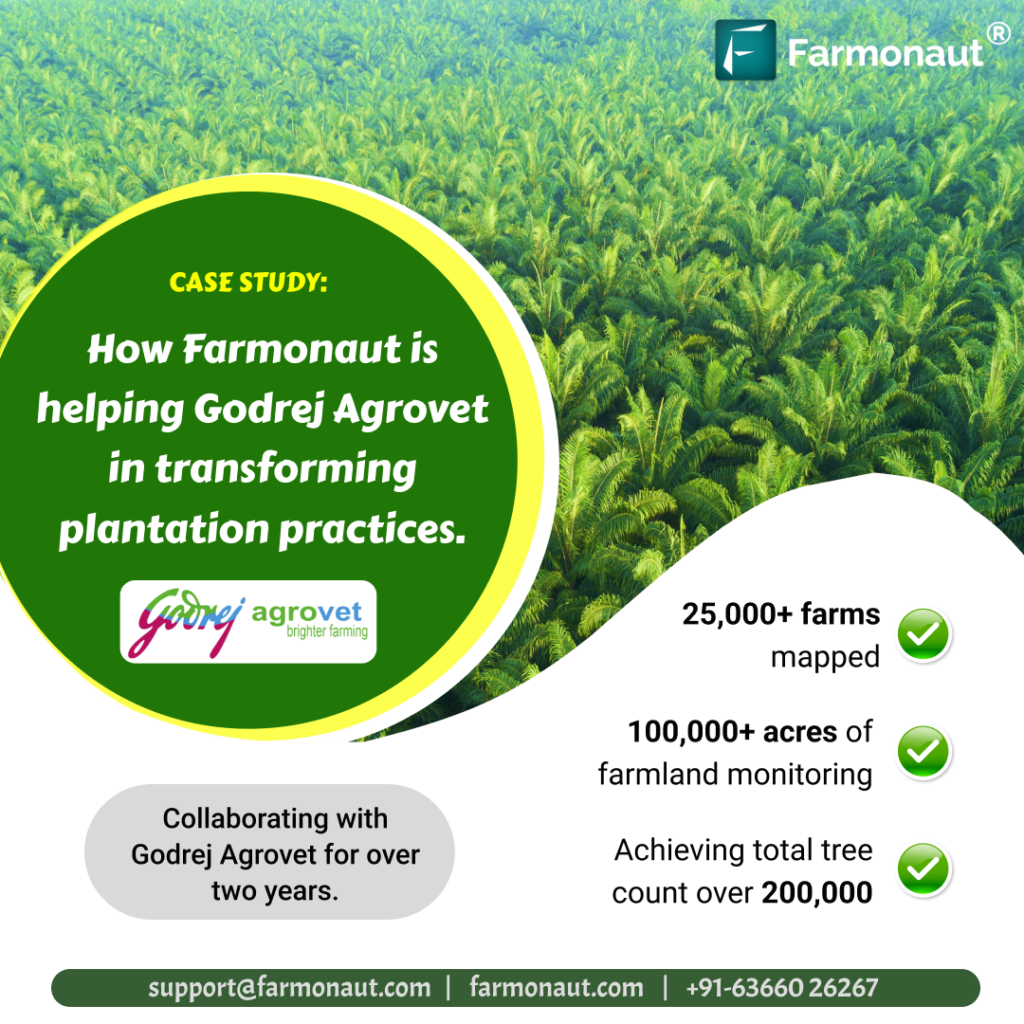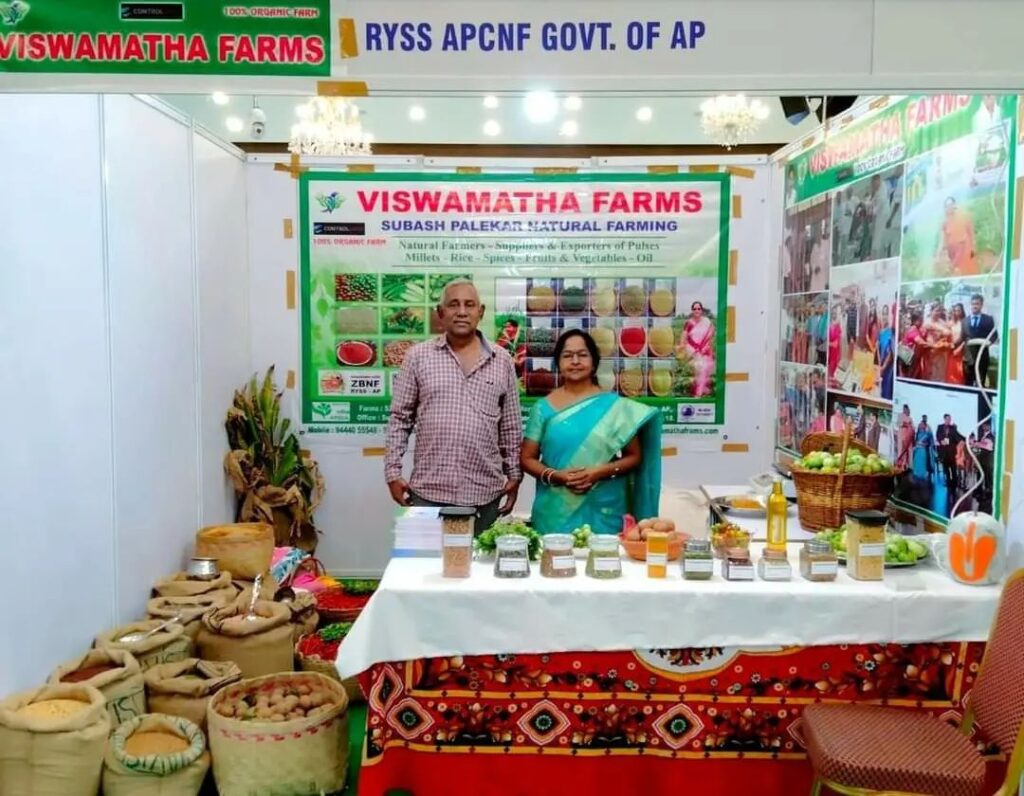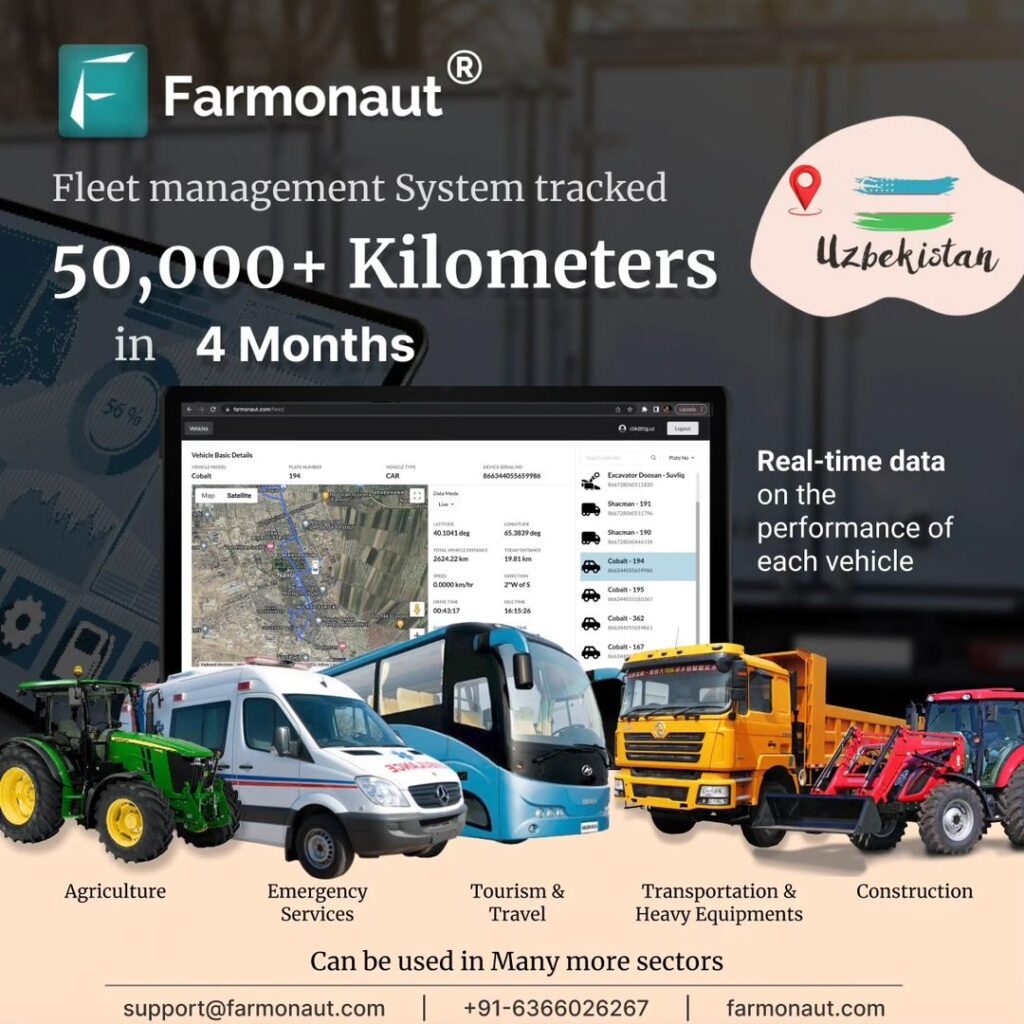Harvesting Success: Viswamatha Farms’ Turmeric Crop and the Future of Precision Agriculture

At Farmonaut, we’re excited to share the latest developments in sustainable farming and precision agriculture. Today, we’re highlighting the success story of Viswamatha Farms and their recent turmeric harvest, while exploring the broader implications for the future of farming.
Viswamatha Farms: A Success Story in Turmeric Cultivation
We’re thrilled to announce that Viswamatha Farms has successfully harvested their turmeric crop. This achievement is a testament to their dedication to quality farming practices and their commitment to meeting global demand for this valuable spice.
Viswamatha Farms is now ready to share its high-quality turmeric with the world. It is fully equipped with an export license, allowing it to distribute its product to international markets. Additionally, it can supply third-party vendors with organic certification, ensuring that its turmeric meets the highest standards of organic farming.
For those interested in acquiring this premium turmeric, Viswamatha Farms can be contacted at +91-9444412849 or +91-6366026267. Whether you’re an international buyer or a local distributor, they’re prepared to meet your needs.
The Importance of Turmeric in Global Markets
Turmeric, known scientifically as Curcuma longa, is more than just a spice. It’s a powerhouse of health benefits and a crucial ingredient in many cuisines worldwide. Let’s explore why turmeric is such a valuable crop:
- Health Benefits: Turmeric contains curcumin, a powerful anti-inflammatory and antioxidant compound. It’s been linked to improved brain function, lower risk of heart disease, and potential cancer prevention.
- Culinary Uses: As a key ingredient in curry powder, turmeric is essential in many Asian cuisines. It’s also gaining popularity in Western cooking for its earthy flavour and vibrant colour.
- Industrial Applications: Beyond food, turmeric is used in textiles as a natural dye and in cosmetics for its skin-benefiting properties.
- Growing Global Demand: The global turmeric market is expected to grow significantly in the coming years, driven by increasing awareness of its health benefits and rising demand for natural food additives.
Precision Agriculture: The Key to Sustainable Turmeric Farming
At Farmonaut, we believe that precision agriculture is crucial for sustainable and efficient farming, especially for high-value crops like turmeric. Our satellite-based farm management solutions are designed to help farmers like Viswamatha Farms optimise crop yields while minimizing resource use.
Here’s how precision agriculture can benefit turmeric cultivation:
- Optimal Water Management: Turmeric requires consistent moisture levels. Our satellite imagery can help farmers monitor soil moisture and make informed irrigation decisions.
- Disease Detection: Early detection of diseases like leaf spot or rhizome rot is crucial. Our AI-powered crop health monitoring can alert farmers to potential issues before they become severe.
- Nutrient Management: Turmeric has specific nutrient requirements. Precision agriculture tools can help farmers apply fertilizers more efficiently, reducing waste and improving crop quality.
- Harvest Timing: Determining the optimal harvest time is crucial for turmeric quality. Our vegetation indices can help farmers identify when their crop has reached peak maturity.
Farmonaut: Empowering Farmers with Cutting-Edge Technology
At Farmonaut, we’re committed to making precision agriculture accessible to farmers of all scales. Our platform offers a range of tools that can significantly benefit turmeric farmers:
- Satellite-Based Crop Health Monitoring: Our advanced satellite imagery provides real-time insights into crop health, helping farmers identify issues early and take corrective action.
- Jeevn AI Advisory System: This AI-powered tool offers personalized recommendations based on crop type, local conditions, and historical data.
- Blockchain-Based Traceability: For organic certified farms like Viswamatha, our blockchain solution ensures transparent and verifiable supply chains.
- Weather Forecasting: Accurate weather predictions help farmers plan their activities and protect their crops from adverse conditions.
To experience these benefits firsthand, we invite you to try our platform:
- Download our app for Android or iOS
- Explore our web application
- For developers, check out our API documentation
Comparing Farmonaut’s Satellite System to Drone and IoT-Based Monitoring
While drones and IoT devices have their place in modern agriculture, Farmonaut’s satellite-based system offers unique advantages, especially for crops like turmeric that are often grown on larger scales:
| Feature | Farmonaut Satellite System | Drone-Based Monitoring | IoT-Based Monitoring |
|---|---|---|---|
| Coverage Area | Vast (entire farms at once) | Limited (requires multiple flights) | Limited (based on sensor placement) |
| Frequency of Data | Regular (based on satellite passes) | As needed (requires manual flights) | Continuous (but localized) |
| Initial Investment | Low (subscription-based) | High (equipment purchase) | Moderate to High (sensors and network) |
| Maintenance | Minimal (cloud-based system) | Regular (drone maintenance) | Regular (sensor maintenance) |
| Ease of Use | High (user-friendly interface) | Moderate (requires training) | Moderate (technical setup) |
| Weather Dependency | Low (can penetrate clouds) | High (affected by wind, rain) | Low (but may be damaged in extreme weather) |
The Challenges of Turmeric Farming and How Precision Agriculture Helps
Turmeric farming, while potentially lucrative, comes with its own set of challenges. Let’s explore these challenges and how precision agriculture, particularly Farmonaut’s solutions, can help address them:
1. Water Management
Challenge: Turmeric requires consistent moisture levels throughout its growth cycle. Too little water can stunt growth, while too much can lead to root rot.
Solution: Farmonaut’s satellite imagery provides regular updates on soil moisture levels across the entire farm. This allows farmers to:
- Identify areas that need irrigation
- Detect over-watered sections
- Optimize irrigation schedules
- Reduce water waste
2. Pest and Disease Management
Challenge: Turmeric is susceptible to various pests and diseases, including the rhizome scale, shoot borer, and leaf spot disease. Early detection is crucial for effective management.
Solution: Our advanced crop health monitoring system can:
- Detect changes in plant health before visible symptoms appear
- Alert farmers to potential pest or disease outbreaks
- Enable targeted treatment, reducing the need for broad-spectrum pesticides
- Track the effectiveness of interventions over time
3. Nutrient Management
Challenge: Turmeric has specific nutrient requirements. Over or under-fertilization can affect both yield and quality.
Solution: Farmonaut’s precision agriculture tools help by:
- Providing detailed vegetation index maps to identify areas of nutrient stress
- Enabling variable-rate fertilizer application based on actual plant needs
- Tracking the effectiveness of fertilizer applications over time
- Reducing fertilizer waste and potential environmental impact
4. Harvest Timing
Challenge: Determining the optimal harvest time is crucial for turmeric quality. Harvesting too early or too late can significantly affect the crop’s value.
Solution: Our satellite-based monitoring can:
- Track crop maturity through vegetation indices
- Provide data-driven insights on the best time to harvest
- Help farmers plan their harvest logistics in advance
- Ensure consistent quality across large farm areas
5. Climate Variability
Challenge: Turmeric is sensitive to temperature extremes and unexpected weather events.
Solution: Farmonaut’s weather forecasting and historical data analysis can:
- Provide accurate short and long-term weather predictions
- Alert farmers to potential extreme weather events
- Help in planning climate-adaptive strategies
- Assist in making informed decisions about planting and harvesting dates
Organic Certification and Its Importance in Turmeric Farming
Viswamatha Farms’ ability to supply turmeric with organic certification is a significant advantage in today’s market. Let’s delve into why organic certification is crucial and how precision agriculture can support organic farming practices:
The Value of Organic Certification
- Consumer Demand: There’s a growing global demand for organic products, with consumers willing to pay premium prices for certified organic turmeric.
- Health Benefits: Organic turmeric is free from synthetic pesticides and fertilizers, making it a healthier choice for consumers.
- Environmental Impact: Organic farming practices promote soil health, biodiversity, and overall ecosystem balance.
- Market Access: Organic certification opens doors to specialized markets and health-conscious consumers worldwide.
How Precision Agriculture Supports Organic Farming
Farmonaut’s precision agriculture tools are particularly valuable for organic farmers:
- Natural Pest Management: Our early detection systems help farmers identify pest issues before they become severe, allowing for timely application of organic pest control methods.
- Soil Health Monitoring: Organic farming relies heavily on soil health. Our satellite imagery can track soil organic matter and help farmers manage crop rotations effectively.
- Water Conservation: Efficient water use is crucial in organic farming. Our soil moisture monitoring helps farmers optimize irrigation without over-watering.
- Traceability: Our blockchain-based traceability system can provide transparent documentation of organic practices, supporting certification processes.
The Global Market for Turmeric: Opportunities and Challenges
As Viswamatha Farms prepares to enter the global market with its export license, it’s worth examining the current state of the international turmeric trade:
Market Overview
- The global turmeric market was valued at approximately $5.3 billion in 2020 and is expected to reach $7.1 billion by 2026.
- Major importing countries include the United States, Japan, the United Kingdom, and Germany.
- India remains the largest producer and exporter of turmeric, accounting for about 80% of world production.
Opportunities
- Growing Health Awareness: Increasing recognition of turmeric’s health benefits is driving demand in both traditional and new markets.
- Diversification of Use: Turmeric is finding new applications in cosmetics, nutraceuticals, and even textile industries.
- Premium Markets: Organic and high-quality turmeric can command premium prices in health-conscious markets.
- Value-Added Products: There’s growing demand for processed turmeric products like extracts and supplements.
Challenges
- Quality Standards: Meeting international quality standards, especially for pesticide residues and curcumin content, can be challenging.
- Price Volatility: Turmeric prices can be volatile due to factors like weather conditions and changing demand.
- Competition: Indian exporters face increasing competition from other producing countries like China and Myanmar.
- Supply Chain Issues: Ensuring consistent quality and timely delivery across long supply chains can be complex.
How Farmonaut Can Help Navigate the Global Market
Our precision agriculture tools can assist turmeric exporters like Viswamatha Farms in several ways:
- Quality Assurance: Consistent monitoring ensures high-quality crops that meet international standards.
- Yield Prediction: Accurate yield forecasts help in managing supply contracts and pricing strategies.
- Traceability: Our blockchain system provides the transparency increasingly demanded by international buyers.
- Sustainability Credentials: Data on resource use efficiency can support claims of sustainable farming practices, which are increasingly valued in global markets.
The Future of Turmeric Farming: Innovations and Trends
As we look to the future, several exciting trends are shaping the turmeric industry. At Farmonaut, we’re committed to staying at the forefront of these developments:
1. Precision Breeding
Advanced breeding techniques are being used to develop turmeric varieties with higher curcumin content or better disease resistance. Our satellite monitoring can help track the performance of these new varieties in real-world conditions.
2. Biofortification
Efforts are underway to increase the nutritional value of turmeric through biofortification. Our precision agriculture tools can help monitor the growth and quality of these enhanced varieties.
3. Sustainable Packaging
The turmeric industry is moving towards more sustainable packaging solutions. Our traceability systems can be extended to track packaging materials, ensuring sustainability claims are verifiable.
4. AI-Driven Crop Management
The future of turmeric farming will likely see increased use of AI for decision-making. Our Jeevn AI system is continually evolving to provide more accurate and personalized recommendations for turmeric cultivation.
Conclusion: Embracing Technology for Sustainable Turmeric Farming
The success of Viswamatha Farms in harvesting their turmeric crop and their readiness to enter the global market with organic certification is a testament to the potential of combining traditional farming knowledge with modern agricultural technology.
At Farmonaut, we’re proud to be part of this agricultural revolution. Our precision agriculture tools are designed to help farmers like those at Viswamatha Farms optimize their operations, increase yields, and meet the growing global demand for high-quality, sustainably produced turmeric.
As we move forward, the integration of satellite technology, AI, and blockchain in agriculture will play an increasingly crucial role in ensuring food security, promoting sustainable farming practices, and connecting farmers with global markets.
We invite all turmeric farmers, whether small-scale growers or large exporters, to explore how Farmonaut’s solutions can transform their operations. Together, we can cultivate a future where technology and tradition work hand in hand to produce the finest turmeric for the world.
FAQs
- Q: How can Farmonaut’s satellite monitoring help in turmeric farming?
A: Farmonaut’s satellite monitoring provides real-time data on crop health, soil moisture, and potential pest or disease issues. This allows turmeric farmers to make informed decisions about irrigation, fertilization, and pest management, optimizing yield and quality. - Q: Is organic certification necessary for exporting turmeric?
A: While not always mandatory, organic certification can significantly increase the marketability and value of turmeric in international markets. Many consumers, especially in developed countries, prefer organic products and are willing to pay premium prices for them. - Q: How does blockchain technology benefit turmeric farmers?
A: Blockchain technology, as offered by Farmonaut, provides transparent and immutable records of the turmeric’s journey from farm to consumer. This enhances traceability, builds trust with buyers, and can help verify organic and sustainability claims. - Q: Can Farmonaut’s system help with pest management in turmeric crops?
A: Yes, Farmonaut’s satellite monitoring can detect early signs of pest infestation or disease by identifying changes in crop health. This allows farmers to take prompt action, potentially reducing the need for chemical pesticides. - Q: How does precision agriculture contribute to sustainable turmeric farming?
A: Precision agriculture, enabled by Farmonaut’s tools, helps optimize resource use. It allows for targeted application of water and fertilizers, reducing waste and environmental impact while maintaining or improving crop yields. - Q: What are the main challenges in exporting turmeric?
A: Key challenges include meeting international quality standards, managing price volatility, navigating complex supply chains, and competing in a global market. Farmonaut’s tools can help address these by ensuring consistent quality, providing yield predictions, and offering traceability. - Q: How can small-scale turmeric farmers benefit from Farmonaut’s technology?
A: Farmonaut’s solutions are designed to be accessible and affordable for farmers of all scales. Small-scale farmers can benefit from crop health monitoring, weather forecasts, and AI-driven advice, helping them optimize their operations and potentially access new markets. - Q: Is turmeric farming suitable for vertical farming methods?
A: While traditionally grown in fields, turmeric is increasingly being cultivated in controlled environments like vertical farms. This allows for year-round production and precise control over growing conditions. Farmonaut is developing solutions to monitor and optimize these indoor growing environments. - Q: How does Farmonaut’s weather forecasting help turmeric farmers?
A: Accurate weather predictions help turmeric farmers plan their activities, such as planting, harvesting, and pest management. It also helps them protect their crops from adverse weather conditions, which is crucial for maintaining quality and yield. - Q: Can Farmonaut’s system help in determining the optimal harvest time for turmeric?
A: Yes, Farmonaut’s satellite monitoring can track crop maturity through vegetation indices. This data can help farmers determine the best time to harvest, ensuring optimal quality and yield of their turmeric crop.
Ready to revolutionize your turmeric farming with precision agriculture? Subscribe to Farmonaut today:
Join us in cultivating a smarter, more sustainable future for turmeric farming!



